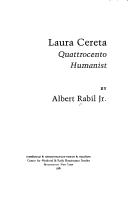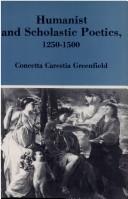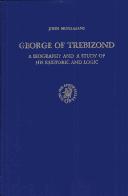| Listing 1 - 10 of 27 | << page >> |
Sort by
|
Book
ISBN: 9781107003620 9781139051613 113905161X 1107003628 9780521177122 052117712X 1108505570 1108514510 9781108514514 Year: 2018 Publisher: New York, NY, USA
Abstract | Keywords | Export | Availability | Bookmark
 Loading...
Loading...Choose an application
- Reference Manager
- EndNote
- RefWorks (Direct export to RefWorks)
In this book, Christopher Celenza provides an intellectual history of the Italian Renaissance during the long fifteenth century, from c.1350-1525. His book fills a bibliographic gap between Petrarch and Machiavelli and offers clear case studies of contemporary luminaries, including Leonardo Bruni, Poggio Bracciolini, Lorenzo Valla, Marsilio Ficino, Angelo Poliziano, and Pietro Bembo. Integrating sources in Italian and Latin, Celenza focuses on the linked issues of language and philosophy. He also examines the conditions in which Renaissance intellectuals operated in an era before the invention of printing, analyzing reading strategies and showing how texts were consulted, and how new ideas were generated as a result of conversations, both oral and epistolary. The result is a volume that offers a new view on both the history of philosophy and Italian Renaissance intellectual life. It will serve as a key resource for students and scholars of early modern Italian humanism and culture.
Renaissance --- Italy --- Civilization --- Intellectual life --- Philosophy, Renaissance --- Renaissance - Italy --- Italy - Intellectual life - 1268-1559 --- Italy - Civilization - 1268-1559
Book
ISBN: 8822229576 9788822229571 Year: 1980 Volume: 59 Publisher: Firenze Olschki
Abstract | Keywords | Export | Availability | Bookmark
 Loading...
Loading...Choose an application
- Reference Manager
- EndNote
- RefWorks (Direct export to RefWorks)
Humanists --- Humanistes --- Antonio, --- Italy --- Intellectual life --- Antonio da Romagno --- poverty --- Humanists - Italy --- Antonio, - da Romagno, - approximately 1360-1409 - Liber de paupertate --- Italy - Intellectual life - 1268-1559
Book
ISBN: 8806056298 9788806056292 Year: 1983 Volume: 147 Publisher: Torino
Abstract | Keywords | Export | Availability | Bookmark
 Loading...
Loading...Choose an application
- Reference Manager
- EndNote
- RefWorks (Direct export to RefWorks)
Dante Alighieri --- Cavalcanti, Guido --- Italian literature --- Civilization, Medieval, in literature --- History and criticism --- Cavalcanti, Guido, --- Dante Alighieri, --- Criticism and interpretation --- Italy --- Intellectual life --- Civilization, Medieval, in literature. --- History and criticism. --- Italian literature - To 1400 - History and criticism --- Cavalcanti, Guido, - -1300 - Criticism and interpretation --- Dante Alighieri, - 1265-1321 - Criticism and interpretation --- Italy - Intellectual life - 1268-1559 --- Cavalcanti, Guido, - -1300 --- Dante Alighieri, - 1265-1321
Book
ISBN: 9781107001138 9780511734762 9781107693654 1107001137 9780511992766 0511992769 1107220114 0511993994 1282967118 9786612967115 0511991770 0511990790 0511989008 051173476X 051198720X 1107693659 Year: 2011 Volume: 83 Publisher: Cambridge Cambridge University Press
Abstract | Keywords | Export | Availability | Bookmark
 Loading...
Loading...Choose an application
- Reference Manager
- EndNote
- RefWorks (Direct export to RefWorks)
"Translation and commentary are often associated with institutions and patronage; but in Italy around the time of Dante, widespread vernacular translation was mostly on the spontaneous initiative of individuals. While Dante is usually the starting point for histories of vernacular translation in Europe, this book demonstrates that The Divine Comedy places itself in opposition to a vast vernacular literature already in circulation among its readers. Alison Cornish explores the anxiety of vernacularization as expressed by translators and contemporary authors, the prevalence of translation in religious experience, the role of scribal mediation, the influence of the Italian reception of French literature on that literature, and how translating into the vernacular became a project of nation-building only after its virtual demise during the Humanist period. Vernacular translation was a phenomenon with which all authors in thirteenth- and fourteenth-century Europe - from Brunetto Latini to Giovanni Boccaccio - had to contend"--
Translating and interpreting --- Language and culture --- Italian literature --- Humanism in literature --- History --- History and criticism --- Italy --- Intellectual life --- Interpretation and translation --- Interpreting and translating --- Language and languages --- Literature --- Translation and interpretation --- Translators --- Translating --- Humanism in literature. --- History and criticism. --- Arts and Humanities --- Culture --- Translating and interpreting - Italy - History - To 1500 --- Language and culture - Europe --- Italian literature - History and criticism --- Italy - Intellectual life - 1268-1559
Book
ISBN: 9782728311231 2728311234 Year: 2015 Volume: 505 Publisher: Rome : École française de Rome,
Abstract | Keywords | Export | Availability | Bookmark
 Loading...
Loading...Choose an application
- Reference Manager
- EndNote
- RefWorks (Direct export to RefWorks)
Qu’est-ce qu’une discipline au Moyen Âge ? Selon que l’on s’intéresse au discours des penseurs médiévaux ou à la reconstruction des historiens contemporains, la réponse pourrait s’avérer très différente, peut-être même décevante. Pour cette raison, l’objectif de ce volume est d’aborder la question non en partant de définitions théoriques souvent figées, mais à travers l’étude des pratiques concrètes des acteurs, lesquelles impliquent parfois perméabilités, évolutions ou hybridations des savoirs. Le choix du contexte italien s’explique par des caractéristiques exceptionnelles. La non séparation de l’enseignement des arts et de la médecine, l’absence dans de nombreuses villes de facultés de théologie, la présence enfin d’une vie culturelle intense dans le cadre urbain, sont autant d’éléments qui contribuent en effet à favoriser les porosités et les innovations. Il s’agira donc d’examiner ces changements du point de vue des frontières, c’est-à-dire des points de rencontre ou de séparation entre les différents savoirs universitaires. Trois domaines ont été privilégiés : la rhétorique et ses usages ; le droit dans ses rapports parfois ambigus avec la philosophie et la théologie ; la médecine et son rôle dans la définition de nouveaux champs comme la médecine légale ou l’éthique médicale. Dans chaque cas, sont croisés les aspects matériels, institutionnels et doctrinaux à l’œuvre dans les déplacements de ces frontières – montrant que les disciplines échappent le plus souvent à leur définition traditionnelle, qu’elle soit médiévale ou contemporaine.
Learning and scholarship --- Education, Higher --- Universities and colleges --- Savoir et érudition --- Enseignement supérieur --- Universités --- History --- Histoire --- Italy --- Italie --- Intellectual life --- Vie intellectuelle --- Savoir et érudition --- Enseignement supérieur --- Universités --- Learning and scholarship - Italy - History --- Universities and colleges - Italy - History --- Italy - Intellectual life - 1268-1559
Book
ISBN: 0300018312 9780300018318 Year: 1976 Publisher: New Haven (Conn.): Yale university
Abstract | Keywords | Export | Availability | Bookmark
 Loading...
Loading...Choose an application
- Reference Manager
- EndNote
- RefWorks (Direct export to RefWorks)
Acculturation --- Renaissance --- History --- Histoire --- Byzantine Empire --- Europe --- Empire byzantin --- Civilization --- Byzantine influences --- Civilisation --- Influence byzantine --- Greeks --- Civilization, Medieval --- Orthodox Eastern Church --- Italy --- Intellectual life --- -Humanists --- -Civilization, Medieval --- -Renaissance --- Revival of letters --- History, Modern --- Civilization, Modern --- Humanism --- Middle Ages --- Medieval civilization --- Chivalry --- Scholars --- Ethnology --- Mediterranean race --- -Greeks --- History. --- Humanists --- Orthodox Eastern Church. --- Civilization. --- Greeks - Italy --- Renaissance - Italy --- Byzantine Empire - Civilization --- Italy - Intellectual life - 1268-1559

ISBN: 0866980024 9780866980029 Year: 1981 Volume: 3 Publisher: Binghamton State university of New York
Abstract | Keywords | Export | Availability | Bookmark
 Loading...
Loading...Choose an application
- Reference Manager
- EndNote
- RefWorks (Direct export to RefWorks)
Authors, Latin (Medieval and modern) --- Women --- Biography --- History --- Cereta, Laura, --- Italy --- Intellectual life --- -Humanists --- -Women --- -Latin authors (Medieval and modern) --- Human females --- Wimmin --- Woman --- Womon --- Womyn --- Females --- Human beings --- Femininity --- Scholars --- -Cereta, Laura --- -Biography --- -Human females --- Latin authors (Medieval and modern) --- Humanists --- Serina, Laura Cereta, --- Cereta Serina, Laura, --- Authors, Latin (Medieval and modern) - Italy - Biography --- Women - Italy - History - Renaissance, 1450-1600 --- Cereta, Laura, - 1469-1499 --- Italy - Intellectual life - 1268-1559
Book
ISBN: 0691068534 Year: 1990 Publisher: Princeton, N.J. Princeton University Press
Abstract | Keywords | Export | Availability | Bookmark
 Loading...
Loading...Choose an application
- Reference Manager
- EndNote
- RefWorks (Direct export to RefWorks)
Free will and determinism in literature. --- French literature --- Italian literature --- Nominalism in literature. --- Renaissance. --- Theology in literature. --- History and criticism. --- France --- Italy --- Intellectual life --- 16th century --- History and criticism --- 15th century --- To 1500 --- 1268-1559 --- Renaissance --- French literature - 16th century - History and criticism. --- Italian literature - 16th century - History and criticism. --- Italian literature - 15th century - History and criticism. --- French literature - To 1500 - History and criticism. --- France - Intellectual life - 16th century. --- Italy - Intellectual life - 1268-1559.

ISBN: 9780838719916 0838719910 Year: 1981 Publisher: Lewisburg Bucknell university press
Abstract | Keywords | Export | Availability | Bookmark
 Loading...
Loading...Choose an application
- Reference Manager
- EndNote
- RefWorks (Direct export to RefWorks)
Poetry --- Latin literature, Medieval and modern --- Literature, Medieval --- Criticism --- Poetics --- Humanists --- Scholasticism --- Rhetoric, Medieval --- History and criticism --- Theory, etc --- History --- Italy --- Intellectual life --- Poetry. --- Poems --- Verses (Poetry) --- Literature --- Theology, Scholastic --- Philosophy --- Philosophy, Medieval --- Evaluation of literature --- Literary criticism --- Rhetoric --- Aesthetics --- European literature --- Medieval literature --- History and criticism&delete& --- Technique --- Evaluation --- Latin literature, Medieval and modern - History and criticism - Theory, etc --- Literature, Medieval - History and criticism - Theory, etc --- Criticism - Italy - History - To 1500 --- Poetics - History - To 1500 --- Humanists - Italy --- Italy - Intellectual life - 1268-1559

ISBN: 9004043705 9789004043701 Year: 1976 Volume: v. 1 Publisher: Leiden Brill
Abstract | Keywords | Export | Availability | Bookmark
 Loading...
Loading...Choose an application
- Reference Manager
- EndNote
- RefWorks (Direct export to RefWorks)
History of philosophy --- Georgius Trapezuntius --- Humanists --- Humanistes --- Biography --- Biographie --- George, --- Italy --- Intellectual life --- 873.4 GEORGIUS TRAPEZUNTIUS --- 82-5 --- -Scholars --- Humanistisch Latijnse literatuur--GEORGIUS TRAPEZUNTIUS --- Redevoering. Preek --- George of Trebizond --- 82-5 Redevoering. Preek --- 873.4 GEORGIUS TRAPEZUNTIUS Humanistisch Latijnse literatuur--GEORGIUS TRAPEZUNTIUS --- Von Trapezunt, Georg --- de Trébizonde, Georges --- -Humanistisch Latijnse literatuur--GEORGIUS TRAPEZUNTIUS --- -873.4 GEORGIUS TRAPEZUNTIUS Humanistisch Latijnse literatuur--GEORGIUS TRAPEZUNTIUS --- Georges, --- Georgius Trapezuntius, --- Giorgio, --- Jorge, --- Trapezuntius, Georgius, --- Georg, --- Georgivs Trapezvn., --- Trapezvn., Georgivs, --- 82-5 Oratory. Speeches. Sermons. Addresses. Lectures. Others --- Oratory. Speeches. Sermons. Addresses. Lectures. Others --- Humanists - Italy - Biography --- George, - of Trebizond, - 1396-1486 --- Italy - Intellectual life - 1268-1559
| Listing 1 - 10 of 27 | << page >> |
Sort by
|

 Search
Search Feedback
Feedback About UniCat
About UniCat  Help
Help News
News